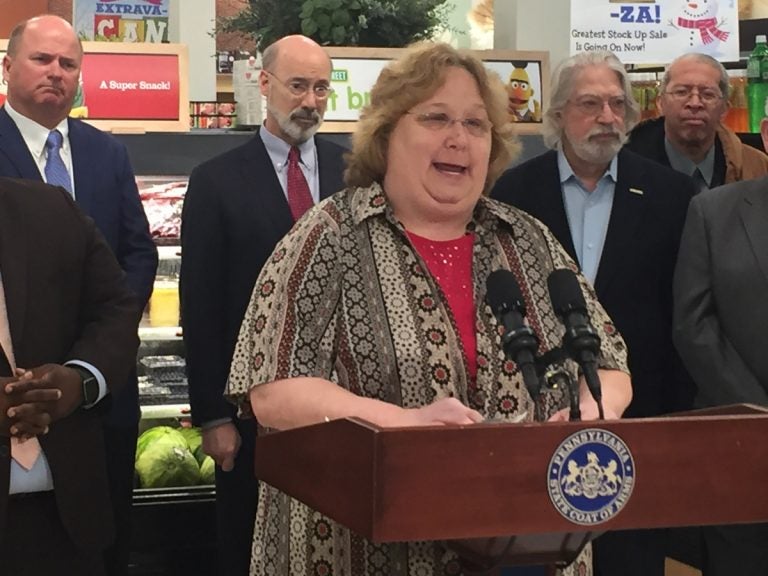Wolf proposes lifting cap on overtime pay for low-wage earners
Pennsylvania rule on eligibility for overtime pay is 40 years old, and governor says it's time for a change.

Denise Kennedy, a 21-year employee at Garrettford Elementary School in Drexel Hill, says she could use overtime to supplement her $35,000 a year salary. (Annette John-Hall/WHYY)
After 21 years working as a school secretary in the Upper Darby School District, Denise Kennedy makes less than $35,000 a year — and she usually works longer than the required 40 hours per week.
“When you work in the public schools, you hit the ground running every day, and there are many days you have to stay until after quitting time,” said Kennedy, who works at Garrettford Elementary School in Drexel Hill. “If a bus is running late or a student is caught up in a late practice … you stay until you get the job done.”
Kennedy said she and her co-workers could benefit from Gov. Tom Wolf’s proposal to raise the salary cap for overtime, a move he said will increase the pay of nearly a half million Pennsylvanians.
Speaking at The Fresh Grocer in the Point Breeze neighborhood of South Philadelphia Wednesday, Wolf said there should be rules in place that compensate Pennsylvanians fairly for their hard work.
“When I was in business, we gave all our employees time and a half if they worked overtime, and I just thought that was normal,” Wolf said. “That’s the way you treat people.”
Wolf added that state laws guiding who gets paid overtime are more than 40 years old, and the time to change them is long overdue.
Pennsylvania’s overtime rules were created back in 1977 to exempt high-wage, white-collar employees. As a result, a salaried worker earning up to $24,000 a year —which today is below the poverty line for a family of four — can work more than 40 hours a week and is not guaranteed overtime at time and a half.
Wolf’s plan would expand the pool of workers eligible for paid overtime over a period of years.
The first phase would make overtime eligible for all full-time salaried employees making up to $31,720 by 2020. The threshold would expand to $39,832 in 2021, followed by $47,892 in 2022, extending overtime eligibility to 370,000 workers and up to 460,000 in four years.
After that, the benchmark salary would rise every three years to ensure that no one would be left behind.
For Kennedy and other low-salaried workers — who often take on second jobs to make ends meet — Wolf’s proposal means much-needed income.
“I work 12 months a year, eight hours or more every day,” Kennedy said. “I’m just looking for fair pay for a fair day’s work.”
WHYY is your source for fact-based, in-depth journalism and information. As a nonprofit organization, we rely on financial support from readers like you. Please give today.




